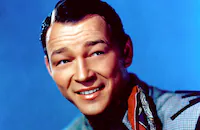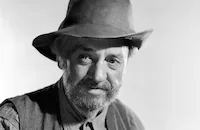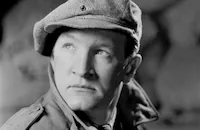Dark Command
Brief Synopsis
Cast & Crew
Raoul Walsh
Claire Trevor
John Wayne
Walter Pidgeon
Roy Rogers
George Hayes
Film Details
Technical Specs

Synopsis
In 1861, William Cantrell, a schoolteacher with a burning ambition to become a leader of men, becomes embittered when he is defeated for the post of marshall of Lawrence, Kansas by Bob Seton, an unlettered but honest cowboy. Despite his mother's pleas to remain honest, Will decides to build his empire on the clandestine running of guns and slaves among neighboring states. His mother, who insists on posing as his housekeeper so that no one will know that he comes from a family in which his father and brother were criminals, warns Will against giving in to his "bad blood," but Will refuses to listen. Will and Bob are both in love with Mary McCloud, the feisty daughter of town banker Angus McCloud, who is a Southern sympathizer. When Mary's wild, younger brother Fletch accidently kills a man who is saying insulting things about their father, Bob reluctantly arrests him. Fletch, who had previously hero-worshiped Bob, now turns against him. Mary pleads with Bob to let her brother go, and even offers to become his wife if he will release Fletch. Bob knows that it is his duty to make Fletch stand trial, however, and refuses her offer. Realizing that he may finally be able to win Mary's love, Will defends Bob at his trial during the day and at night rides with his guerillas to terrorize each jury member into voting for an acquittal. His tactics with the jury work and Fletch is soon found not guilty and released. When the Civil War breaks out, Will's men, in the guise of Confederate soldiers, begin a campaign of looting and pillaging. As Will becomes richer and more powerful, people begin to suspect him, especially as Lawrence is the only town that seems to have been free from the raids. While the war continues, sympathizers for the North and South become more and more divided in Lawrence. Because Mary's father is a strong supporter of the South, many of the townspeople turn against him and start a run on his bank. McCloud stands up to the crowd in his bank, but soon violence erupts and he is killed. Now feeling very alone and believing that Will is not only a good friend but a good Southern soldier, Mary finally agrees to marry him. Right after their marriage, Will leaves Mary to rejoin his men, whom Mary thinks are part of the Confederate army. Soon everyone but Mary knows what Will is and the town begins to hate her. Bob decides to resign his job and leave Lawrence because he is disgusted by recriminations against Mary, then comes to her aid upon learning that a crowd is planning to run her out of town for the crimes of her husband. Bob begs her to leave Will, but she still refuses to believe the stories of her husband's spoils and insists that he take her to Will's camp. Before they reach the camp, Bob asks Mary to leave Will and come to Texas with him, but she refuses to be disloyal to Will, even though she now realizes that she loves Bob. At the camp, Mary sees that Will's "soldiers" are actually an unruly band of outlaws, and when she sees that Will is living in splendor, she knows that the stories about him have been true. When she and Fletch, who earlier had idealistically joined Will's men, learn that Will has ordered Bob arrested and sentenced to death, they realize that they must save him. Hearing that Lawrence is the next stop on Will's dark command, Fletch helps Bob escape and they ride to town to warn everyone. As Lawrence is consumed in the guerilla's flames, Will's mother is killed while trying to stop her son and Will is shot by Bob.

Director

Raoul Walsh
Cast

Claire Trevor

John Wayne

Walter Pidgeon

Roy Rogers

George Hayes

Porter Hall

Marjorie Main

Raymond Walburn

Joseph Sawyer
Helen Mackellar

J. Farrell Macdonald
Trevor Bardette
Al Bridge
Tom London
Edward Hearn

Glenn Strange
Crew
Jan Fortune
F. Hugh Herbert
Kenneth Holmes
Lionel Houser
Grover Jones
John Victor Mackay
Jack Marta
William Morgan
Adele Palmer
Murray Seldeen
Sol Siegel
Al Wilson
Victor Young

Videos
Movie Clip



Film Details
Technical Specs

Award Nominations
Best Art Direction
Best Music Original Dramatic Score
Articles
Dark Command
Wayne plays Bob Seton, a Lawrence, Kansas cowboy who is rather unexpectedly elected to the office of town marshal. The loser in the election, an ambitious schoolteacher named Will Cantrell (Walter Pidgeon), is outraged that an uneducated man like Seton could defeat him. Then, to make matters worse, Seton starts falling for a woman named Mary McCloud (Claire Trevor), who Cantrell also loves. When Mary's brother (Roy Rogers) is tried for murder at Seton's behest, Cantrell sets into motion a series of events that result in much bloodshed.
Easily the most unforgettable moment in Dark Command is an amazing stunt orchestrated by Yakima Canutt. Canutt and several other stunt men slid down a chute into a river forty feet below...along with a wagon and an entire team of horses. It's an indelible sight for a number of reasons, not the least of which being that the horses were put in great danger for the sake of a piece of celluloid. This stunt, and several others that ended up killing animals in The Charge of the Light Brigade (1936), alerted the ASPCA that major changes needed to take place in the handling of animals while filming motion pictures. Today, any picture that includes animals has an ASPCA member on hand to keep the filmmakers in line.
Dark Command was Republic's ambitious attempt to take advantage of Wayne's new-found fame, and major studios began to reconsider him as leading man material when the film became a hit. But Cecil B. DeMille, for one, discovered that Wayne wasn't about to forget any previous slights now that he had a bit of weight to throw around.
In 1936, when DeMille was casting The Plainsman, he was supposed to meet with Wayne about a possible role in the film. "I sat outside that bastard's office," Wayne later said, "and I could look in there and see him just thinking. So after about an hour - the son of a bitch kept me waiting that long - he came out and said, "Well, I'm going for lunch." When reminded that he had an appointment to meet with Wayne, DeMille offhandedly invited the actor to come along, in a manner that Wayne felt was openly disrespectful. At lunch, DeMille told Wayne that he liked him pretty well in The Big Trail (1930), but "a lot of water had run under the bridge since then."
Then, in 1940, when Wayne was the new toast of Hollywood, DeMille politely called him to have a print of Dark Command sent to his office. "Make him come here if he wants to see it," Wayne told Republic executive Sol Siegel. "Just tell him that a lot of water has run under the bridge since I'd seen him last." Not surprisingly, Wayne and DeMille never got around to working together.
Director: Raoul Walsh
Producer: Sol C. Siegel
Screenplay: Grover Jones, Lionel Houser, F. Hugh Herbert, Jan Fortune (based on the novel by W.R. Burnett)
Cinematography: Jack Marta
Music: Victor Young
Editor: Murray Seldeen, William Morgan
Art Design: John Victor Mackay
Principal Cast: John Wayne (Bob Seton), Claire Trevor (Mary McCloud), Walter Pidgeon (William Cantrell), Roy Rogers (Fletch McCloud), George "Gabby" Hayes (Doc Grunch), Porter Hall (Angus McCloud), Marjorie Main (Mrs. Cantrell), Raymond Walburn (Buckner), Joe Sawyer (Bushropp), Helen MacKellar (Mrs. Hale), J. Farrell MacDonald (Dave), Trevor Bardette (Hale).
BW-94m. Closed captioning.
by Paul Tatara

Dark Command
Quotes
You're no good, Will.- Mrs. Cantrell
I've killed men for saying less than that!- William Cantrell
You've killed a lot of men for saying nothing at all!- Mrs. Cantrell
I know what I'm doing, Ma. I'll be running Kansas yet. I'm going clear up to the top. But I'm not going for the climb or the view.- William Cantrell
Trivia
Notes
According to a Hollywood Reporter news item, this was Republic's biggest budget production in over a year and cost approximately $750,000 to film. Other Hollywood Reporter news items noted that the film's production stopped on December 23, 1939 because actress Claire Trevor, who was ill with a serious case of strep throat, could not continue with the picture for several weeks. Director Raoul Walsh shot around Trevor for the previous week, however, the production could not advance further without her. Production resumed in early February 1940.
The character of Will Cantrell was loosely based on the actual historical figure William Clarke Quantrill (1837-1865), a former teacher turned outlaw who pillaged the states of Kansas and Missouri during the early part of the Civil War. In 1862, he became a Confederate officer and formed a notorious guerrilla band known as "Quantrill's Raiders." On August 21, 1863, Quantrill led his Raiders, which included Jesse and Frank James and the Younger Brothers, in a brutal attack against the people of Lawrence, Kansas, a Union stronghold. As the war was ending, Quantrill was killed by Federal forces in Kentucky.
Reviews consulted were very positive in their assessment of the film and predicted its popularity at the box office. Modern sources confirm that the picture did very well for Republic and for John Wayne's career. It was nominated for Academy Awards in the Art Direction (Black-and-White) and Music (Original Score) categories. It was the third picture that co-starred Trevor and Wayne within a year. Their earlier films together were Stagecoach (see below) and Allegheny Uprising, both released in 1939. They made one additional film together, The High and the Mighty, directed by William Wellman in 1954.
Modern sources include Dick Alexander, Yakima Canutt, Hal Taliaferro, Edmund Cobb, Ernie Adams, Jack Rockwell, Harry Woods, Harry Cording, Frank Hagney, Dick Rich, John Dilson, Clinton Rosemond, Budd Buster, Howard Hickman, John Merton, Al Taylor, Mildred Gover, Jack Low, Ferris Taylor, Edward Earle, Joe McGuinn, Harry Strang, Tex Cooper and Jack Montgomery in the cast.

Miscellaneous Notes
Released in United States 1940
Released in United States 1940













